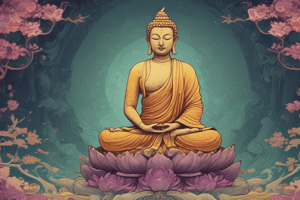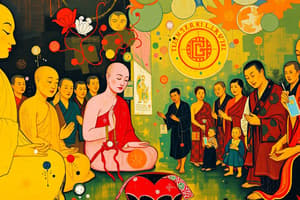Podcast
Questions and Answers
What are the two Sila that can be observed by laymen?
What are the two Sila that can be observed by laymen?
Five precepts and Eight precepts with Right Livelihood (Ajiva Ashtamaka Sila)
What are the precepts in 'Eight precepts with Right Livelihood' that are not found in the five precepts?
What are the precepts in 'Eight precepts with Right Livelihood' that are not found in the five precepts?
The precepts of abstaining from harsh/abusive speech and abstaining from meaningless conversation
What are the precepts in 'Eight Uposatha precepts' that are not found in the five precepts?
What are the precepts in 'Eight Uposatha precepts' that are not found in the five precepts?
The precepts of abstaining from sexual conduct, abstaining from eating at improper times, abstaining from dancing, singing, wearing garlands and beautifying with cosmetics, and abstaining from luxurious and comfortable seats and beds
Match the 'Eight precepts with Right Livelihood' and 'Eight Uposatha precepts' in order (Precept and Meaning in English):
Match the 'Eight precepts with Right Livelihood' and 'Eight Uposatha precepts' in order (Precept and Meaning in English):
What are the two Sila that can be observed by laymen?
What are the two Sila that can be observed by laymen?
What are the precepts in 'Eight precepts with Right Livelihood' that are not found in the five precepts?
What are the precepts in 'Eight precepts with Right Livelihood' that are not found in the five precepts?
What are the precepts in 'Eight Uposatha precepts' that are not found in the five precepts?
What are the precepts in 'Eight Uposatha precepts' that are not found in the five precepts?
Match the 'Eight precepts with Right Livelihood' and 'Eight Uposatha precepts' in order (Precept and Meaning in English):
Match the 'Eight precepts with Right Livelihood' and 'Eight Uposatha precepts' in order (Precept and Meaning in English):
Flashcards are hidden until you start studying
Study Notes
Eight Precepts with Right Livelihood and Eight Uposatha Precepts
- People and animals share similar characteristics, but what differentiates humans is their ability to practice virtuous conduct, which is shaped by religion and values.
- In Sri Lankan society, Buddhism plays a significant role in shaping culture, values, and customs.
- The Lord Buddha laid down separate precepts for Bhikkus and laymen, and as laymen, we can observe the five precepts and the Eight Precepts with Right Livelihood (Ajiva Ashtamaka Sila) daily.
Eight Precepts with Right Livelihood (Ajiva Ashtamaka Sila)
- 1. Abstaining from killing beings: ensures life without fear of death and safeguards the life of all beings.
- 2. Abstaining from stealing: assures the safety of other’s properties and helps them live without fear of losing their belongings.
- 3. Abstaining from sexual misconduct: leads to a happy family life, promotes trust in society, and prevents harmful diseases.
- 4. Abstaining from telling lies: prevents deceiving others and promotes trust in society.
- 5. Abstaining from slandering: prevents disunity among people and abstains from carrying tales to others.
- 6. Abstaining from harsh speech: prevents using harsh words or dirty words that hurt others and are not acceptable in society.
- 7. Abstaining from useless conversation: wastes time and does not fulfill any purpose, instead engage in virtuous talk or stay silent.
- 8. Abstaining from wrong livelihood: follows a righteous way of life, ensuring that work is done in a fair way without deceiving others for personal gain.
Eight Uposatha Precepts
- On full moon Poya days, laymen can observe the Uposatha Ashtanga Sila (උෙප සථ අ ටාංග ලය).
- The Eight Precepts are observed by laymen, school children, and women in schools and temples on full moon Poya days.
Eight Uposatha Precepts
- 1. Abstaining from killing living beings: ensures life without fear of death and safeguards the life of all beings.
- 2. Abstaining from stealing: assures the safety of other’s properties and helps them live without fear of losing their belongings.
- 3. Abstaining from sexual conduct: leads to a happy family life, promotes trust in society, and prevents harmful diseases.
- 4. Abstaining from telling lies: prevents deceiving others and promotes trust in society.
- 5. Abstaining from taking intoxicating drinks and drugs: prevents harm to oneself and others.
- 6. Abstaining from eating at improper times: follows a healthy and balanced lifestyle.
- 7. Abstaining from dancing, singing, wearing garlands, and beautifying with cosmetics: focuses on simplicity and modesty.
- 8. Abstaining from luxurious and comfortable seats and beds: promotes humility and detachment from worldly desires.
Eight Precepts with Right Livelihood and Eight Uposatha Precepts
- People and animals share similar characteristics, but what differentiates humans is their ability to practice virtuous conduct, which is shaped by religion and values.
- In Sri Lankan society, Buddhism plays a significant role in shaping culture, values, and customs.
- The Lord Buddha laid down separate precepts for Bhikkus and laymen, and as laymen, we can observe the five precepts and the Eight Precepts with Right Livelihood (Ajiva Ashtamaka Sila) daily.
Eight Precepts with Right Livelihood (Ajiva Ashtamaka Sila)
- 1. Abstaining from killing beings: ensures life without fear of death and safeguards the life of all beings.
- 2. Abstaining from stealing: assures the safety of other’s properties and helps them live without fear of losing their belongings.
- 3. Abstaining from sexual misconduct: leads to a happy family life, promotes trust in society, and prevents harmful diseases.
- 4. Abstaining from telling lies: prevents deceiving others and promotes trust in society.
- 5. Abstaining from slandering: prevents disunity among people and abstains from carrying tales to others.
- 6. Abstaining from harsh speech: prevents using harsh words or dirty words that hurt others and are not acceptable in society.
- 7. Abstaining from useless conversation: wastes time and does not fulfill any purpose, instead engage in virtuous talk or stay silent.
- 8. Abstaining from wrong livelihood: follows a righteous way of life, ensuring that work is done in a fair way without deceiving others for personal gain.
Eight Uposatha Precepts
- On full moon Poya days, laymen can observe the Uposatha Ashtanga Sila (උෙප සථ අ ටාංග ලය).
- The Eight Precepts are observed by laymen, school children, and women in schools and temples on full moon Poya days.
Eight Uposatha Precepts
- 1. Abstaining from killing living beings: ensures life without fear of death and safeguards the life of all beings.
- 2. Abstaining from stealing: assures the safety of other’s properties and helps them live without fear of losing their belongings.
- 3. Abstaining from sexual conduct: leads to a happy family life, promotes trust in society, and prevents harmful diseases.
- 4. Abstaining from telling lies: prevents deceiving others and promotes trust in society.
- 5. Abstaining from taking intoxicating drinks and drugs: prevents harm to oneself and others.
- 6. Abstaining from eating at improper times: follows a healthy and balanced lifestyle.
- 7. Abstaining from dancing, singing, wearing garlands, and beautifying with cosmetics: focuses on simplicity and modesty.
- 8. Abstaining from luxurious and comfortable seats and beds: promotes humility and detachment from worldly desires.
Studying That Suits You
Use AI to generate personalized quizzes and flashcards to suit your learning preferences.




